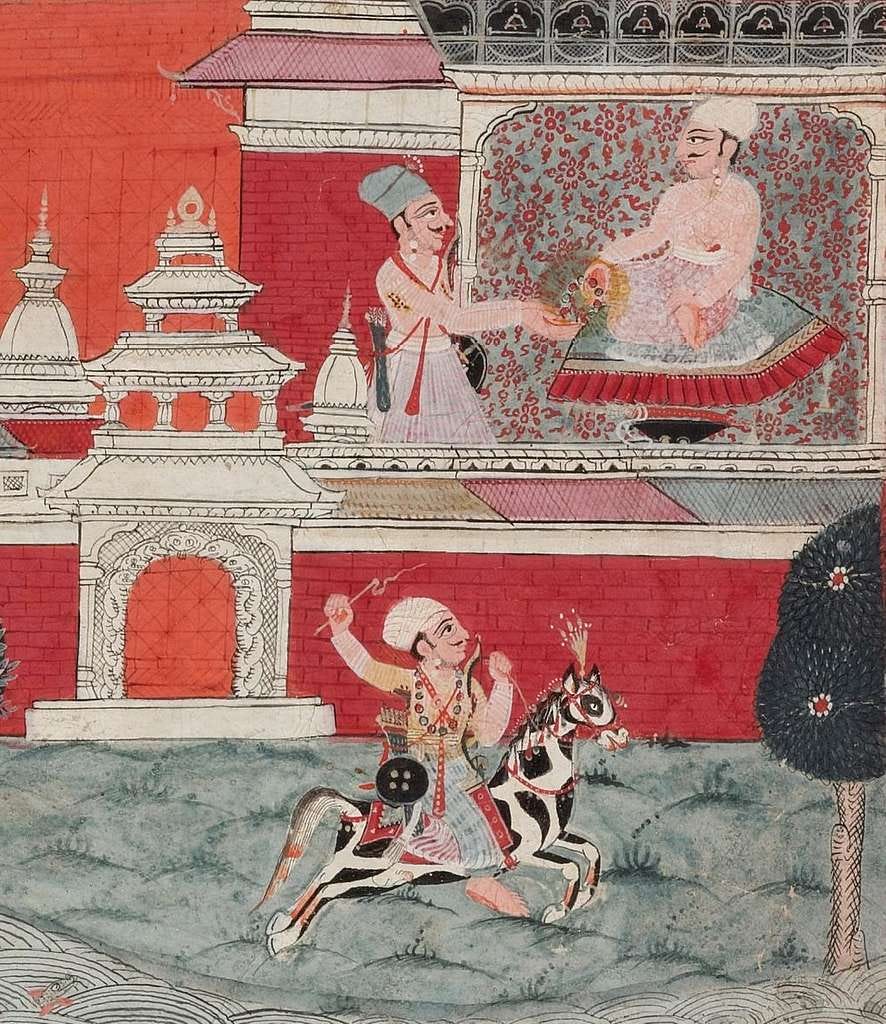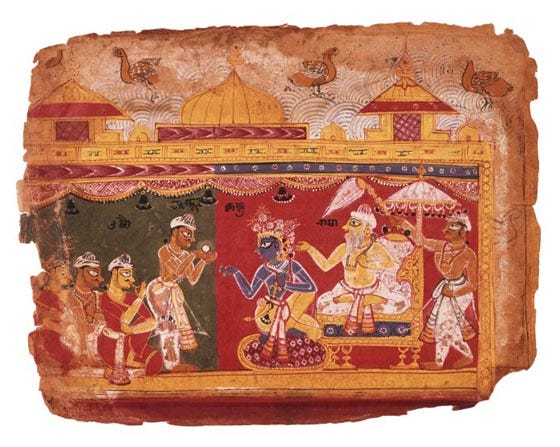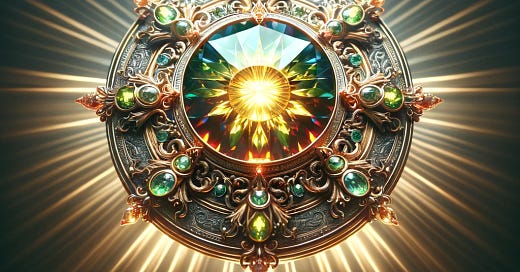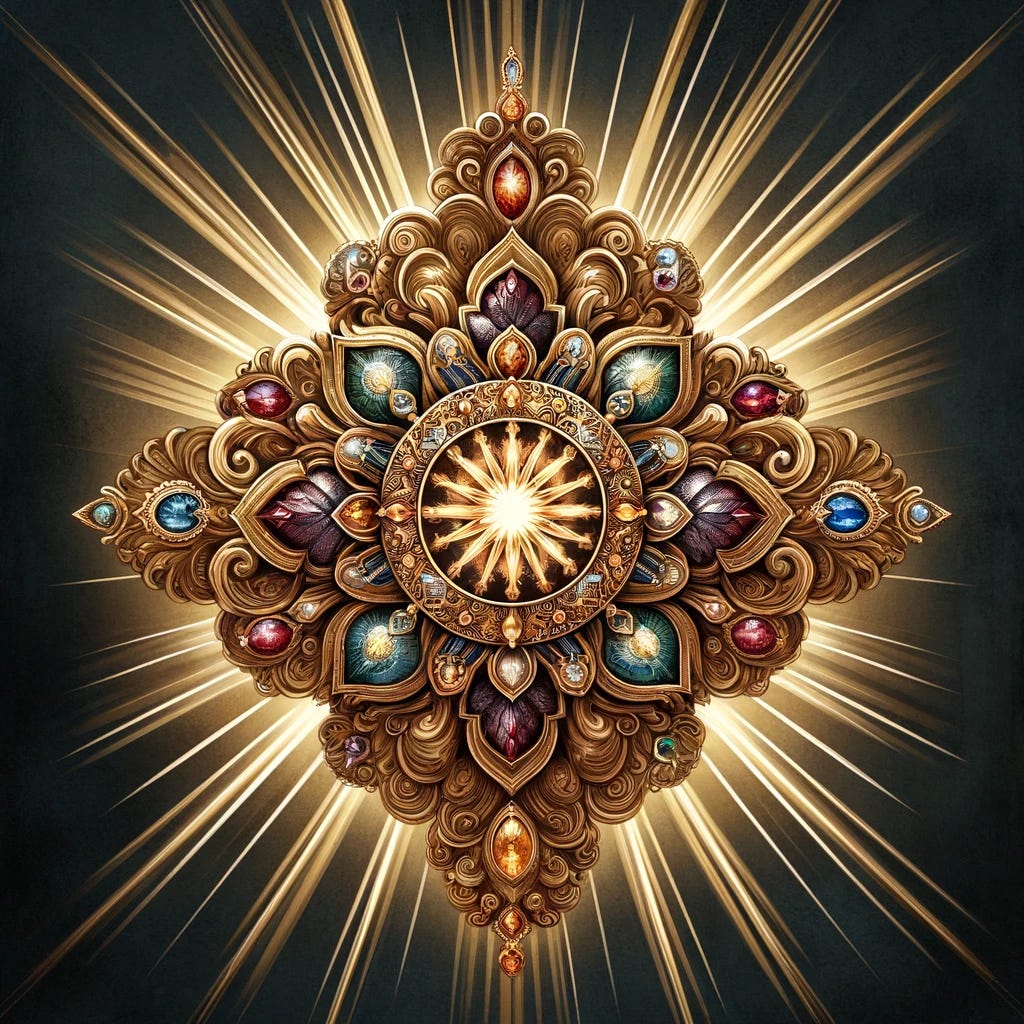Krishna, the playful one, always smiling, pranking, in control, and aware of his power as the Preserver-God, one day, found himself accused of stealing a jewel.
What jewel? How can a God be accused? Why did Krishna need a jewel? Who was this accuser? Did Krishna indeed steal a jewel? Or was it a prank? What happened to the accuser?
These might be the immediate questions that arise in your mind. I shall answer them as I invite you to enjoy this ancient story that remains relevant in our modern world of unbalanced relationships.
Consider upgrading to access premium content: get an original look at stories, both ancient and modern. Redeem this lifetime welcome offer for just $5.10 a month!
There was once a King (isn’t there always one in an ancient tale?) who worshipped the Sun-God, Surya. Pleased, the Sun-God gifted him a beautiful jewel. The Sun-jewel dazzled the eye, being one of its kind.
It was a rare jewel that protected its owner, providing him with an abundance of gold daily and blazed magnificently, its aura filling the environs. When the King wore it, it was as though the Sun-God himself had arrived in person.
Even Krishna, on a visit to the King's residence, couldn't help but admire the jewel. He suggested that it might befit the King to present it to the ruler of the land, who happened to be Krishna's grandfather. But the owner of the jewel refused to be so charitable! Who could blame him? Except that this was Krishna suggesting it!
However, one day, the King did lend it to his brother. Wearing the jewel around his neck, the brother ventured deep into the forest for a hunting expedition but failed to return.
As the days stretched on and the brother remained missing, the King began to suspect foul play. Who was his prime suspect? Krishna, of course - for it was Krishna who had admired the jewel and suggested it be donated to the royal treasury.
With no news of his brother, the King would not keep his suspicions to himself. He began to imply aloud that Krishna might be involved in his brother's disappearance and the loss of the jewel.
Soon enough, Krishna heard of the missing brother’s incident and the subsequent whispers. Shocked, Krishna tried to clear his name. To no avail. The jewel was still missing. How could he prove his innocence?
The only way he saw was to discover what happened to it, and return it to its rightful owner, the King, and salvage his reputation.
Crowds, mobs, enemies, friends, advisors, and well-wishers - there is no limit to who and when they can suspect you of the strangest things when paranoia sets in.
Or maybe you woke up on the wrong side of the bed one morning, some may believe.
Or when stars are misaligned, a soothsayer might suggest.
Krishna was not given to much rumination or dwelling on the past. He did not vacillate on the decision to immediately set out to find the jewel.
In this endeavor, he was accompanied by a few of his trusted circle of followers who believed in his innocence.
Soon, Krishna and his band arrived in the thick forest where the brother had begun his hunting trek.
They found animal tracks deep within the forest. Following these, the party discovered the brother’s body, with lion tracks leading away from it.
Eventually, they located the lion that had killed the man, now also lying dead, yet there was still no sign of the Sun-jewel.

Tracking signs of a new animal, they arrived at the entrance of a set of caves beneath the mountain and found the tracks of the wild animal leading inside.
Krishna determined it was his adventure alone, and asked his companions to wait outside the caves for him to return.
Inside the dark and unknown caves, went the dark-skinned Lord of the cowherds, unafraid and looking for answers.
Navigating the maze of tunnels, Krishna reached a large section where the cave suddenly expanded into a deeper open area with a higher stone ceiling. There, he encountered a bear cub playing with the Sun-jewel.
This was the animal’s home! It turned out to be a black bear, the King of bears, who had made his home beneath the mountain.
Krishna approached the cub and confirmed that it was indeed the same jeweled necklace he had been seeking, which settled his doubts.
He then asked the bear cub to hand over the necklace. Instantly, the cub started calling for his father.
Hearing his child's call, the father bear, a giant adorned with a golden crown, came rushing out with a huge roar.
As the bear stood tall and roared, confronting Krishna, it appeared even more menacing than a modern-day grizzly.
Krishna met him head-on, and a momentous battle ensued.
For twenty-eight days and nights, without any break, the God and the bear-King fought to gain ascendancy over each other.
The strongest bear on earth was surprised that any human could fight this hard, little knowing whom he fought.
As for Krishna, he probably was having fun fighting, as it is hard to imagine Krishna being serious even in a fight. I suppose it comes from knowing your own power and place in the Universe.
Whatever the situation, the companions outside began to grow restless. Too many days had passed since Krishna had entered the caves.
'Was he also dead?' they wondered. 'What were they to do?' He had strictly ordered them to wait here for him, but for how long? Who had ever heard of Krishna being bested in a fight for twenty-eight days and nights?
Inside, the fierce fight continued, but the bear was tiring. Krishna had also drawn first blood, yet he was none the worse for it.
He did not have a scratch on him, nor did he take a heavy breath that might indicate a slowing of his reflexes.
Finally, the bear broke, and, defeated, fell back.
Surprised that he had been bested, the bear kept panting, taking short breaths, and watched as Krishna waited patiently for him to recover.
Seeing the bear's puzzled glance, Krishna smiled.
The moment he smiled, the bear immediately saw his beloved God, Rama, in place of Krishna.
Krishna had transformed into Rama, giving his devotee a rare glimpse of who he was, and the bear fell at his feet.
This was the same brave and wise bear who had accompanied Rama as part of his army when Rama had to fight the great demon king, Ravana, to rescue his wife.
The bear exclaimed, “Rama, you were testing me. I knew it could not be anyone other than you who could defeat me. If not for my ego, I would have recognized you much sooner. Forgive me.”
Returning to the form of Krishna, the Preserver-God blessed his devotee and lifted him from the floor.
Krishna explained the reason for his visit and the need to take the jewel back to clear his name.
The bear revealed that he had encountered the lion that had killed the King’s brother and made off with the jewel, dragging the brother’s body with it.
He had killed the lion and taken the jewel as a plaything for his cubs deep within his cave, thus solving the mystery of the missing jewel.
Krishna wanted to return immediately. But the bear would not hear of it. He insisted on also offering his human daughter in marriage to Krishna.
Krishna accepted, and in the middle of a deep cavern married Jambavati, the daughter of the Bear King, Jambavan1.
Outside, the companions, believing Krishna to be dead, huddled together to discuss how to break this news to Krishna’s older brother and the King, who doted on Krishna. Who would be willing to face the wrath of that sibling?
Some suggested that they needed proof before they went back.
Others refused to enter the cave, unwilling to violate Krishna’s directive.
Luckily for all of them, it never came to a vote. Krishna returned to them safely, with the jewel and a new bride.
Rejoicing in this happy occurrence, the entire group returned to the kingdom.
Krishna, in full Court, lest there be any more doubt, recounted, to the suspicious King, what had happened with the lion, the bear, and his fight with the bear. His companions served as witnesses, having waited outside the cave.
This revelation left everyone in the court feeling ashamed of their suspicions, especially those who had accused Krishna of thievery.
To further demonstrate the regret felt by the denizens and the royal family, the King offered his daughter in marriage to Krishna, along with the jewel.

Krishna accepted the bride and was wed, once again, to Princess Satyabhama, making her his third wife2. He politely declined the jewel!3
Not only did Krishna recover his reputation and the jewel, but he also gained the love and respect of the new kingdom and acquired two new wives. Being a God is not easy.
However, upon his return to his own kingdom, Krishna was troubled. His trusted royal sage, sensing his concern, inquired about his worries.
Krishna wanted to understand why he was ensnared in this tale of unfair accusation.
Moreover, he questioned how so many people could readily believe that he would lust after a mere jewel, even if it was a remarkable artifact.
The royal sage, who was also a gifted seer, reminded Krishna of the time when he had accidentally glimpsed the full moon during the annual festival celebrating the Elephant-God, Ganesha.
Therein lies a tale.
The moon-God, ‘Chandra’4, had once laughed at the portly God who was returning home from a dinner party one night. Ganesha, his form overtly showing his love of desserts, had slipped and fallen.
Offended by the moon-God mocking him, Ganesha cursed him that if anyone saw the moon during the worship of Ganesha, they would attract false accusations and become mired in controversy.
The moon-God was immediately contrite and begged pardon of the powerful Ganesha. After all, who wants to be a God who can affect humans in such a manner?
Ganesha was mollified when the moon-God repented deeply. He amended the effect by suggesting a remedy: Whosoever accidentally sees the moon would be protected from the fallout of this curse by listening to the story of Krishna and the Sun-jewel he was accused of stealing.5
Thus it is to this day, during the annual Ganesh festival when the moon shines the brightest and is hard to miss, you are advised not to see the moon.
I once did as a teenager, when the moon begged for a view, shining bright and nearly full. It always appears full on the festival day, as if daring you to catch a glimpse.
Immediately, I was directed to listen to the story which I recounted to you today.
I hope you enjoyed this original retelling!
Jambavan is believed to have been created by Brahma, the Creator-God, and is wise, smart, and strong. Yes, he did have the ability to have a human daughter! Even if not, would Krishna not be able to turn her into one?
His wives were in effect, different manifestations of the Preserver-God’s consort, Goddess Lakshmi.
The jewel is called ‘Syamantaka Mani’; Sanskrit = ‘Syamantaka’ (Divine - of the Sun God) + ‘Mani’ (jewel)
Now you know where Hindu names originate! Know any person named Ganesh, Surya, or Chandra? Hindus often name their children after Gods and Goddesses. Mani is also common!
Which came first, the curse or the stolen jewel? Who knows? Either way, there is a remedy.






Actually two tales in one, interwoven beautifully. You are a gifted story teller, Jayshree.
As for the Elephant God, I’ve got a little story. Many years ago, I needed to take my old cat to the vets for a procedure and I had booked a taxi. The driver was a bad-humoured man who kept using his mobile phone while driving. I was terrified he’d get an accident.
I had noticed on the dashboard a small figurine of Ganesh, and by the time we had nearly arrived, I mentioned to him that I had noticed the Ganesh figurine.
He got into a fit and asked if I didn’t know it was a Buddha! The first Buddha with the head of an elephant! 🙄
I declined going home with that taxi.
Beautiful story, Jayshree! I didn’t know that Jambhavan had lived long enough to meet Krishna. I knew that Hanuman, being immortal, appears in the Mahabharata, but I thought he was the only one to stick around that long!